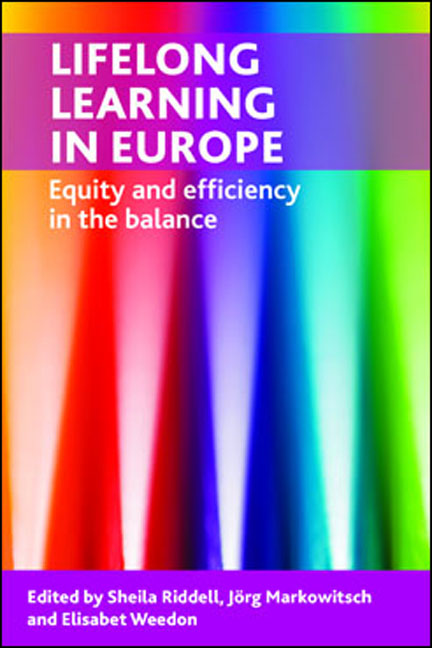Book contents
- Frontmatter
- Contents
- List of figures, tables and case studies
- Notes on contributors
- List of contributors, by country, to the EU Sixth Framework Project ‘Towards a Lifelong Learning Society in Europe: The Contribution of the Education System’ (LLL2010)
- one Lifelong learning and the generation of human and social capital
- two Lifelong learning and the wider European socioeconomic context
- three Neoliberal and inclusive themes in European lifelong learning policy
- four Formal adult education in the spotlight: profiles, motivations and experiences of participants in 12 European countries
- five The sociodemographic obstacles to participating in lifelong learning across Europe
- six The qualification-providing enterprise? Support for formal adult education in small and medium-sized enterprises
- seven Reducing or reinforcing inequality: assessing the impact of European policy on widening access to higher education
- eight Conclusion: the role of lifelong learning in reducing social inequality at a time of economic crisis
- Technical annex to Chapter Four
- Glossary of terms and abbreviations
- Index
seven - Reducing or reinforcing inequality: assessing the impact of European policy on widening access to higher education
Published online by Cambridge University Press: 01 September 2022
- Frontmatter
- Contents
- List of figures, tables and case studies
- Notes on contributors
- List of contributors, by country, to the EU Sixth Framework Project ‘Towards a Lifelong Learning Society in Europe: The Contribution of the Education System’ (LLL2010)
- one Lifelong learning and the generation of human and social capital
- two Lifelong learning and the wider European socioeconomic context
- three Neoliberal and inclusive themes in European lifelong learning policy
- four Formal adult education in the spotlight: profiles, motivations and experiences of participants in 12 European countries
- five The sociodemographic obstacles to participating in lifelong learning across Europe
- six The qualification-providing enterprise? Support for formal adult education in small and medium-sized enterprises
- seven Reducing or reinforcing inequality: assessing the impact of European policy on widening access to higher education
- eight Conclusion: the role of lifelong learning in reducing social inequality at a time of economic crisis
- Technical annex to Chapter Four
- Glossary of terms and abbreviations
- Index
Summary
Introduction
During the post-war period across Europe, higher education was only available to a small proportion of the population, with an over-representation of men and those from socially advantaged backgrounds. As Europe has sought to transform itself over the last decade into ‘the most competitive and dynamic knowledge based economy in the world capable of sustainable economic growth with more and better jobs and greater social cohesion’ (CEC, 2000), the importance of higher education has been increasingly recognised. Workers in knowledge economy occupations clearly require higher levels of education, so, from the 1990s onwards, human capital logic suggested that there were strong grounds for equipping a higher proportion of the population with tertiary level qualifications. However, the expansion of higher education was not driven solely by economic concerns, but was also seen as a means of promoting social cohesion by opening the doors of professional and managerial jobs to a wider section of the population. In addition, enabling more people to benefit from a liberal education was seen as a good in itself, producing a more enlightened and cultured society. One of the earliest education targets established by the EU in 2010 was that all countries should aim to achieve a 40% participation rate in higher education by 2020, an extremely challenging target for some.
Of course, widening access policies were not the only, or indeed the major, focus of higher education policy in Europe from the 1990s. As noted by Marginson (2008), throughout this period, universities in the developed world were jostling for position within a global educational market. The establishment of international league tables encouraged universities to compete for research funds and, particularly in English-speaking countries, for the recruitment of international students as a source of revenue. Within some countries, particularly the UK, national league tables intensified competition between institutions for the best staff and students. Increasingly, higher education has been defined as a ‘positional good’ (Hirsch, 1976) in which some student places are seen to offer better social status and lifetime opportunities than others. Hirsch noted that ‘positional competition … is a zero-sum game. What winners win, losers lose’ (Hirsch, 1976, p 52). Within any one nation, there is a limit on the number of positional goods at a given level of value.
- Type
- Chapter
- Information
- Lifelong Learning in EuropeEquity and Efficiency in the Balance, pp. 125 - 150Publisher: Bristol University PressPrint publication year: 2012



